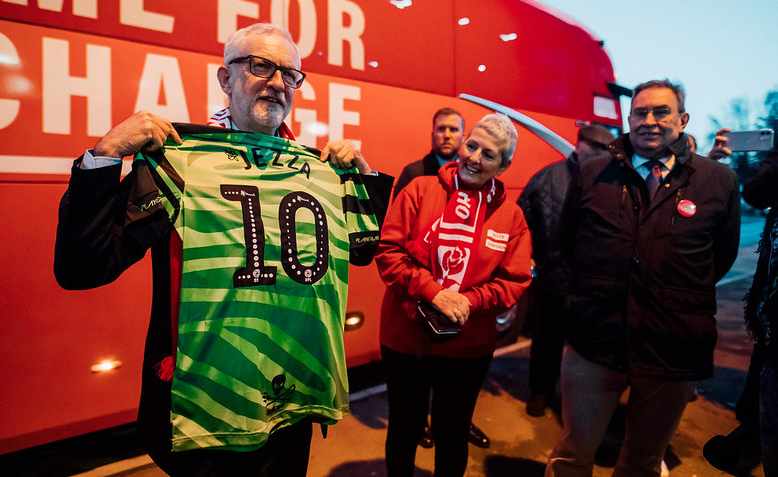 Jeremy Corbyn visiting Forest Green Rovers Football Club in 2019. Photo: Flickr/Jeremy Corbyn
Jeremy Corbyn visiting Forest Green Rovers Football Club in 2019. Photo: Flickr/Jeremy Corbyn
Counterfire Books have published an anthology of Lindsey German’s acclaimed briefing reports. Here we present an extract from the book’s introduction as a contribution to a wider debate on post-Corbynism.
Corbynism has dominated left strategy and politics for much of the past five years. That era is now at an end. Whoever replaces Corbyn as Labour leader will not have the same political experience, instincts or record, and there are many signs that Labour will move to the right in the interests of ‘electability’. For Tony Blair, the election result of 2019 proved his argument that voters will never elect a left Labour government, a position which conveniently overlooks the opposite case two years ago. The Labour right is demanding that Labour drops issues such as nationalisation and continues on its well-worn path of seeking to embody the more ‘humane’ face of neoliberalism; the very path which has led to a weakening of traditional social democratic parties across most of Europe.
Yet there is no evidence that Corbyn’s policies were unpopular. There was a problem with believing that Labour would implement them, and there was a problem with the sheer number of policies. But there were two crucial issues which above all contributed to the defeat: Brexit and antisemitism. The way Labour responded to both issues had a detrimental impact on how Corbyn was perceived and led to much worse results than in 2017:
Both these issues were weaponised, both inside and outside Labour, in order to weaken the left. While the 2017 result rocked Labour’s right in the first instance, it also led to a change in strategy. Preceding direct onslaughts on Corbyn’s position – the ‘chicken coup’ following the referendum result and the Owen Smith leadership challenge – had clearly failed. The 2017 results underlined that they would fail again. Following that election, it is clear that Corbyn’s opponents redoubled their efforts to get rid of him, this time by weaponising the issues of Brexit and antisemitism.
The tilt towards a second referendum, directed by Corbyn’s enemies through the People’s Vote campaign, became open policy by the summer of 2019 and was used as a wedge by the likes of Keir Starmer to divide Labour’s left. Corbyn’s supporters themselves often went along with this, even Diane Abbott and John McDonnell in the latter stages. Those who sought to stick to the policy of respecting the referendum result proved nowhere near as decisive.
Even worse was the attack over antisemitism, incessantly used as a stick with which to beat Corbyn and his supporters. This onslaught is set to continue. Already all the leadership candidates have signed up to demands from the Jewish Board of Deputies which would effectively strip Labour of control over its complaints procedure and ensure a never-ending offensive against left-wing Jewish groups like Jewish Voice for Labour.
The onslaught based on the repeated use of these wedge issues led to retreats and constant attacks on Corbyn and those around him. This in turn undermined his unpopularity, partly because the endless attacks had a ‘mud sticks’ effect, and partly because retreats on these policies made him look more like a slippery run-of-the-mill politician. This then led to an increased reliance on playing safe, of seeking to look like a ‘government in waiting’ rather than continuing the insurgency which fuelled Corbyn’s original ascent.
All of this played into the hands of the right. It has always been clear that the Blairites would rather have the Tories in power than a Corbyn government, and that is what they got.
The last briefing in this collection marks the end of the election, but the future for socialists is about much more than finessing election analysis or discussing future elections. We are now at a crossroads. The right will do their best to push back the left advance as far as they can, and they are already having some success. The reaction against Corbynism will continue.
It strikes me that for socialists both inside and outside Labour this will require two central responses. There has to be a thoroughgoing discussion about what socialism is and how it can be achieved. And there also has to be a commitment to continuing to fight the manifestations of exploitation and oppression which are everywhere, and which will only be exacerbated by this vicious Tory government.
One certainty is that left politics will shift away from a focus on Parliament and elections towards activity outside of Westminster. Already there have been a number of local victories for strikes and an increase in balloting for strike action. There are many campaigns in progress, over issues from climate change to NHS funding. Socialists have to put themselves at the centre of these campaigns and actions and be part of every struggle by working people.

